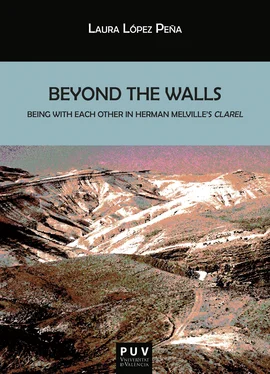Laura López Peña - Beyond the Walls.
Здесь есть возможность читать онлайн «Laura López Peña - Beyond the Walls.» — ознакомительный отрывок электронной книги совершенно бесплатно, а после прочтения отрывка купить полную версию. В некоторых случаях можно слушать аудио, скачать через торрент в формате fb2 и присутствует краткое содержание. Жанр: unrecognised, на английском языке. Описание произведения, (предисловие) а так же отзывы посетителей доступны на портале библиотеки ЛибКат.
- Название:Beyond the Walls.
- Автор:
- Жанр:
- Год:неизвестен
- ISBN:нет данных
- Рейтинг книги:3 / 5. Голосов: 1
-
Избранное:Добавить в избранное
- Отзывы:
-
Ваша оценка:
- 60
- 1
- 2
- 3
- 4
- 5
Beyond the Walls.: краткое содержание, описание и аннотация
Предлагаем к чтению аннотацию, описание, краткое содержание или предисловие (зависит от того, что написал сам автор книги «Beyond the Walls.»). Если вы не нашли необходимую информацию о книге — напишите в комментариях, мы постараемся отыскать её.
Beyond the Walls. — читать онлайн ознакомительный отрывок
Ниже представлен текст книги, разбитый по страницам. Система сохранения места последней прочитанной страницы, позволяет с удобством читать онлайн бесплатно книгу «Beyond the Walls.», без необходимости каждый раз заново искать на чём Вы остановились. Поставьте закладку, и сможете в любой момент перейти на страницу, на которой закончили чтение.
Интервал:
Закладка:
By making sense of the world, according to Arendt, human beings “humanize” reality: “We humanize what is going on in the world and in ourselves only by speaking of it, and in the course of speaking of it we learn to be human” (“Humanity” 25). In this process of interpretation and consequent humanization, Arendt vindicates openness to others as the conditio sine qua non of humanity (15). In a similar way to Derrida and Buber, Arendt locates in interpersonal relationships, particularly in friendship, a fundamental political potentiality, defending that dialogue may restore human beings’ relationship with the world and with other human beings. As Arendt and other philosophers conceive it, therefore, dialogue is central to intersubjectivity, since it is the process by which bonds between individuals (an inter-human space of negotiation and possibility) may be developed. The development of such space, through dialogue, gradually enables the development of plural thinking as well, which, in turn, makes possible a questioning and transcendence of monologic conceptions of Meaning: “as soon as it is uttered”, Arendt claims, truth “is immediately transformed into one opinion among many”, which is immediately and inevitably “contested, reformulated, reduced to one subject of discourse among others” (27). Projects that uphold a single Truth, Arendt argues, are consequently “inhuman” because “a single truth, could there have been one, […] would have spelled the end of humanity” (27). For Arendt, even Kant’s cosmopolitan project is one among those that reinforce a particular Truth, since she claims that “[w]hatever the merits of their arguments, the inhumanity of Kant’s moral philosophy is undeniable” due to the fact that his philosophical teachings are based on the premise that an absolute Truth exists, and Kant imposes his Truth about interhuman relationships as an absolute (27). In her articulation of dialogue as a space of plural thinking and possibility, Arendt uses the phrase “critical judgment”, explaining that critical judgment stimulates the development of an “enlarged mentality” (241), because it places different individuals and their worldviews in conversation with one another in an intersubjective engagement that enables a negotiation of meaning. Critical judgment, therefore, as Arendt considers it, is the seed enabling politics and democratic political thought:
Political thought is representative. I form an opinion by considering a given issue from different viewpoints, by making present to my mind the standpoints of those who are absent; that is, I represent them. This process of representation does not blindly adopt the actual views of those who stand somewhere else, and hence look upon the world from a different perspective; this is a question neither of empathy […] nor of counting noses and joining a majority, but of being and thinking in my own identity where actually I am not. The more people’s standpoints I have present in my mind while I am pondering a given issue, and the better I can imagine how I would feel and think if I were in their place, the stronger will be my capacity for representative thinking and the more valid my final conclusions, my opinion. (It is this capacity for an “enlarged mentality” that enables men to judge; as such, it was discovered by Kant in the first part of his Critique of Judgment —who, however, did not recognize the political and moral implications of his discovery). (241)
Arendt emphasizes the ethical and political implications of the exercise in critical judgment she describes, which is important to this study’s analysis of Melville’s project in Clarel . Furthermore, Arendt’s notion of critical judgment can be connected to Ernesto Laclau’s theory of “hegemony” in his articulation of universalism, which, revising Gramscian genealogy of this concept, Laclau defines as the relationship that emerges from the dialogic interaction of different particulars, in which each individual element can temporarily occupy the space of the “empty signifier” of the universal. Most importantly, Arendt’s critical judgment can also be related to the dialogism and construction of “Manysidedness” ( Clarel 3.16.263) in Melville’s oeuvre. In this dialogism, in the capacity to create plural thinking on a textual (and, hopefully, supratextual) level, and in the spaces formed between individuals through their intersubjective conversations, Melville located the possibility of de-transcendentalizing Meaning and encouraging manysidedness in his works.
Similarly to Arendt, philosopher Martin Buber has also placed in interpersonal relationships the possibility of both ethics and politics, conceiving intersubjectivity as a vehicle to de-transcendentalize monolithic Truths. As a matter of fact, Buber argues that it is through interpersonal dialogue that human beings may learn that one’s own “relation to truth is heightened by the other’s different relation to the same truth—different in accordance with his individuation, and destined to take seed and grow differently” (“Social” 65). By this active exercise of seeing the other approaching the same “truth” as me from his/her unique perspective the other is affirmed as a self, as another I, in the same way that Ishmael affirms Queequeg’s subjectivity in the passage from Moby-Dick that was previously anticipated as a representative instance of intersubjectivity in Melville’s oeuvre. This process triggers a plural thinking with the power to transcend, and challenge, individual monologic assumptions and worldviews. In consequence, intersubjectivity goes beyond mere sympathy for, or tolerance of, the other, since it holds the other as a “partner in a living event” (69), not as an object on which to propagate one’s “identity” and worldview. According to Buber, both partners unfold to each other in the interpersonal space, which becomes a connecting space between their two existences, through a dialogue which enables the sharing of each of their selves. This sharing, Buber claims, constitutes the meaning of “truth”: “Whatever the meaning of the word ‘truth’ may be in other realms, in the interhuman realm it means that men communicate themselves to one another as what they are” (71). Such communication is not the mere telling of a narrative but a sharing of beings, necessarily different, and the cultivation of the inter-human space (72). This way, openness to the other constitutes the foundation of human relationships across traditional boundaries humans have interiorized as natural. In this respect, Zygmunt Bauman notes, dialogue may facilitate the development of a universalism, which, the sociologist claims, is not incompatible, as it has traditionally been regarded, with plurality:
Universalism is not the enemy of difference; it does not require “cultural homogeneity”, nor does it need “cultural purity” and particularly the kind of practices which that ideological term refers to. The pursuit of universality does not involve the smothering of cultural polyvalence or the pressure to reach cultural consensus. Universality means no more, yet no less either, than the across-the-species ability to communicate and reach mutual understanding—in the sense, I repeat, of “knowing how to go on”, but also knowing how to go on in the face of others who may go on—have the right to go on—differently. ( Search 202)
This universalism already points to alternative bonds and forms of belonging, attachment, relating, feeling, and organizing beyond traditional communities and even beyond the nation-state model. These alternative bonds are fully based and dependent on the plurality by which they are constituted. As Bauman states: “Such universality reaching beyond the confines of sovereign or quasi-sovereign communities is a conditio sine qua non of a republic reaching beyond the confines of sovereign or quasi-sovereign states; and the republic doing just that is the sole alternative to blind, elemental, erratic, uncontrolled, divisive and polarizing forces of globalization” (202).
Читать дальшеИнтервал:
Закладка:
Похожие книги на «Beyond the Walls.»
Представляем Вашему вниманию похожие книги на «Beyond the Walls.» списком для выбора. Мы отобрали схожую по названию и смыслу литературу в надежде предоставить читателям больше вариантов отыскать новые, интересные, ещё непрочитанные произведения.
Обсуждение, отзывы о книге «Beyond the Walls.» и просто собственные мнения читателей. Оставьте ваши комментарии, напишите, что Вы думаете о произведении, его смысле или главных героях. Укажите что конкретно понравилось, а что нет, и почему Вы так считаете.










